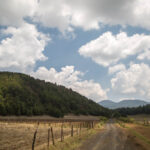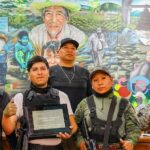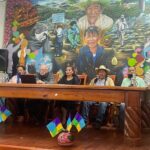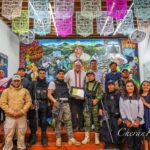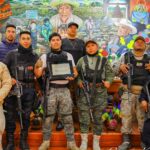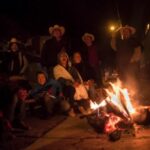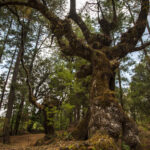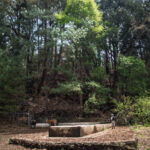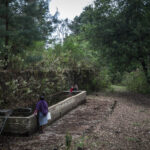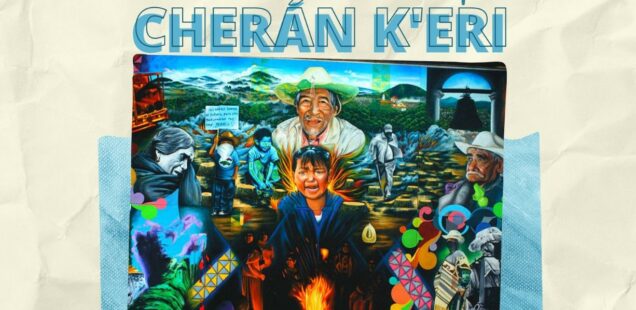
The Cherán K’eri Indigenous Community : a charismatic symbol of local autonomy
The Indigenous Community of Cherán K’eri has succeeded in reclaiming control of its territory and embarked on a long journey to recover its cultural heritage, traditions, and language. In the process it expelled the national political parties to establish a new system of governance and some communal enterprises that contribute to economic solvency and the availability of social services for collective well-being. To ensure its viability, with the help of a collective of local lawyers, it has promoted a legal action that went all the way to the Supreme Court of the Nation to establish its recognition and the right to exercise a direct budget, corresponding to the way local governments are financed in Mexico.
As background, it is essential to recognise the courage of a group of women who decided in 2011 to stand up against the organised crime that had been sowing violence, robberies, and cutting down trees in their forests for many years. The turning point that triggered this reaction was when these activities began to directly threaten their water sources for community consumption and agricultural production. What was unique about this reaction was the mobilisation of a group of approximately 30 women with their children and young children without weapons (not even sticks) who stood in the road in front of the trucks that were coming down from the forest loaded with timber.
The community mobilised to support them and in the following weeks a discussion was sparked off through “bonfires” in each of the neighbourhoods – a traditional way of making decisions after discussions in which all members of the community participate – which resulted in the organisation of a security force which controlled access to the community; these “community patrols” continue to ensure security and good coexistence in the municipality. This awareness-raising opened the possibility for the community to engage in a dialogue in which the creation of a self-governing body was agreed upon, as well as the decision to initiate a process of reclaiming their cultural traditions, strengthening the use of their ancestral language, and demanding its recognition by state and federal authorities and institutions. In other words, the community decided to achieve its own self-determination.
The first achievement of their self-government was the disregard of the party system that had facilitated the entry of the illegal wood cutters as well as the disregard of the local “authorities”, elected in political processes. They instituted a traditional system – according to their own customs— to elect their municipal authorities (not without great resistance from the State authorities). Faced with the State’s refusal to allow them to manage the local budget that corresponded to them, they had to embark on a long legal journey, with the support of a collective of supportive lawyers (Colectivo Emancipaciones) who offered human resources and expertise; they eventually won the case in the Supreme Court of the Nation, invoking the Constitution and Convention 169 of the International Labour Organisation.
The decision to award the Feyerabend Prize comes at a time when the community has celebrated twelve years since their local uprising. An indicator of the profound change within the community is the addition of the adjective “K’eri” to its name. K’eri means ‘great’ in Purépecha, the language of the ethnic group, reflecting not only its territorial extension and the size of its population, but also – and especially – the wisdom and grandeur that their history has given them.
The Governing Council follows a rotational process of accountability for community leadership with balanced gender participation. They have created four community enterprises. There is a clear reordering of social relations within the community, recognising a new gender equality and the incorporation of youth groups and elders in collective work and cultural activities. Of singular importance is the model they have sown; several dozen other indigenous communities in the region are forcing governmental bodies to start negotiating to move forward in extending Cherán’s achievements to other parts of the region.
The Cherán K’eri Indigenous Community has become a charismatic symbol of the possibilities and results of exercising local autonomy. So far, the community has concentrated its efforts on strengthening its own institutions and demanding recognition of the rights established by the Mexican Constitution and international institutions. Other communities in the region are making their own advances in achieving the “direct budget” that allows them to direct their activities with greater autonomy and to move away from the political party system that has distanced local governments from solving local problems and to direct their attention to providing the public and social services that are their responsibility. The Cherán experience offers an example of the possibilities and the need for internal mobilisation to assert the rights that are promised by international fora.
For more information:
- https://www.youtube.com/watch?v=rvm-Cn9LC7w
- https://www.youtube.com/watch?v=GDULdeqV_2I
- https://www.youtube.com/watch?v=QhxnzGG4TEQ
- https://www.youtube.com/watch?v=xr1hapswLd0
- https://www.youtube.com/watch?v=SrPBdLiqMb0&t=131s
- https://www.youtube.com/watch?v=Dql9_kKBwws
- https://www.youtube.com/watch?v=SrPBdLiqMb0
- Aragon Andrade, Orlando. El derecho en insurrección. Hacia una antropología jurídica militante desde la experiencia de Cherán. Con: Chávez Sánchez, Pedro, Concejo Mayor, Cherán Kerí. UNAM-ENES Morelia; 2019.
- Calveiro, Pilar. Resistir al neoliberalismo. Comunidades y autonomías. Siglo XXI-CLACSO; 2019.
- Concejo Mayor de Gobierno Comunal de Cherán K´eri . Cherán K´eri, Michoacán, Mex. [Web Page]. 2021. Available at: https://www.concejomayor.gob.mx/contacto.html.
- Concejo Mayor de Cherán K’eri. ]uchari eratsiktta, Cherán k ‘eri: retrospectiva histórica, territorio e identidad étnica. Cherán, Michoacán: Consejo Mayor, 2018. https://www.dropbox.com/s/eusxy2hw5fb1lcq/Libro%20electronico%20Juchari%20eratsikua%202018.pdf?dl=0
- Consejo de Jóvenes. Las Luchas de Cherán: Desde la memoria de los jóvenes. Cherán K’eri: Cherán Ireteri Juramukua; 2021.
- Gasparello, Giovanna. Communal Responses to Structural Violence and Dispossession in Cherán, Mexico. Latin American Perspectives. 2021; 48(1)(236):42-62.
- Gembe Velázquez, Gloria Angélica and Durán, Javier. “Gobierno comunal de Cherán Keri, Michoacán. En: Makaran, Gaya; López, Pabel, and Wahren, Juan , Coords. Vuelta a la autonomía: Debates y experiencias parala emancipación social desde América Latina. México: Bajo Tierrra-UNAM; 2019; pp. 165-178.
- Gómez Ochoa, Brisa Guadalupe. Los Huertos Faimiliares: Alternativa a la alimentación y a la economía familiar en Cherán: Chapingo; 2019.
- Hernández García, Ma. Aide. ¿Se puede vivir sin partidos políticos? Multiculturalismo y capital social: Cherán. Guanajuato/México: Porrua/UGto; 2020.
- Jerónimo Juárez, Luis Fernando. Bienes comunes, empresa comunitaria y desarrollo local. La comunidad indígena de Cherán K’eri, Michoacan, México: Centro de Estudios para el Desarrollo Rural Sustentable y la Soberanía Alimentaria, Cámara de Diputados, 2022. http://www.cedrssa.gob.mx/files/b/8/41Bienes_comunes_empresa_comunitaria_desarrollo_local.pdf
- Martínez Aparicio, Jorge. San Francisco Cherán: Revuelta comunitaria por la autonomía, la reapropiación territorial y la identidad. Economía y Sociedad. 2017; XXI (36):145-166.
- Martínez Navarrete, Edgars. The forest belongs to those who work it! Multifaceted dispossession, relations of production, and ethnicity within processes of indigenous autonomy in Cherán, Mexico. Latín American and Carubbean Ethnic Studies. 2021; 150-173.
- Moreno Badajoz, Rocio (Coord.). Cherán K’eri: Caminos para recordar nuestra educación. Guadalajara y Cherán: Universidad de Guadalajara y Concejo Mayor del Gobierno Comunal de Cherán. https://drive.google.com/file/d/1zxpH9_xM1qQ0XrFBgwyyvTrv4oY5Sk1L/view
- Ortega, Guadalupe, producer; Robles, Xavier, director. La Luz del Alba México: El Principio Producciones; 2021. https://vimeo.com/ondemand/laluzdelalbapelicula/553405780?autoplay=1. (Video)
- Pedroza, Jesús Ángel and Torres Tomás, Salvador. Kuínkakatsļ. El que desata las palabras. Editorial Morevalladolid; 2017.
- Valenia Hernández, Carlos Arnulfo. Etnicidad y Autonomía en Cherán-K’eri: Una reflexión horizontal. Guadalajara: CALAS/UdG; 2021. 190 .
- Ventura Patiño, Carmen. Emergencia indígena en Michoacán. Ejercicios de derecho de facto y de jure. Espiral. Estudios Sobre El Estado y Sociedad. 2018; 25(73) :161-201.
- Ventura Patiño, Carmen and Uzeta Iturbide, Jorge. Derechos indígenas en disputa. Colegio de Michoacan; 2017.

